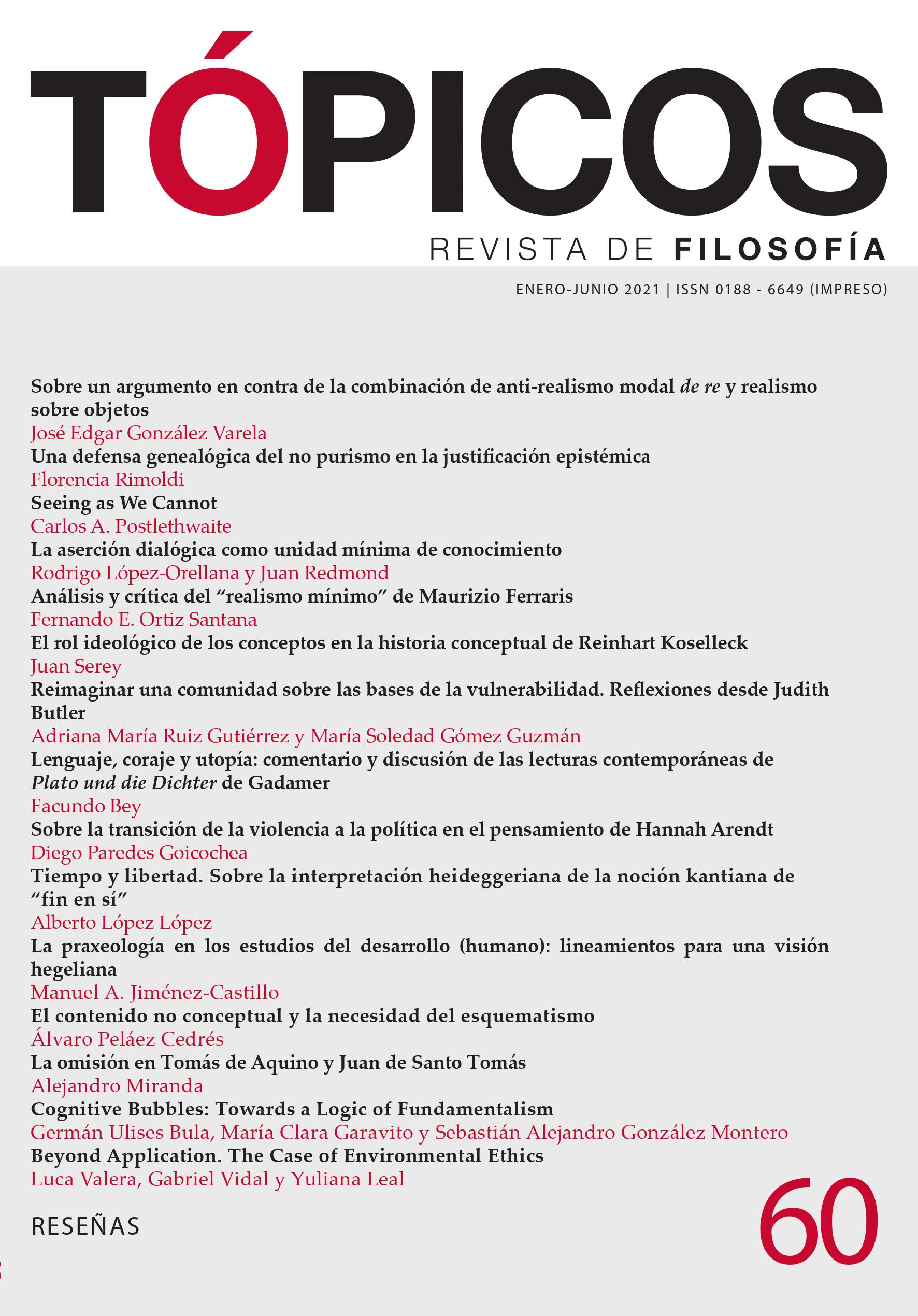Publicado 2020-10-27
Palabras clave
- convencionalismo,
- individuación,
- identidad,
- necesidad de re,
- relativismo
Cómo citar
Resumen
Algunos filósofos piensan que el anti-realismo sobre la necesidad de re implica anti-realismo sobre la individuación e identidad de objetos. En este trabajo me ocupo de un argumento a favor de esta tesis, debido a Sidelle (2010), según el cual la única manera en que un convencionalista modal de re puede evitar ser refutado por un conocido argumento basado en la contingencia de las convenciones es aceptando también un convencionalismo sobre objetos. Muestro que el argumento de Sidelle no es exitoso y, de esta manera, muestro que la combinación de anti-realismo modal de re y realismo sobre objetos no se ve amenazada, al menos, por esta vía.
Referencias
- Blackburn, S. (1986). Morals and Modals. En G. MacDonald y C. Wright (eds.), Fact, Science and Morality: Essays on A. J. Ayer’s Language, Truth and Logic. (pp. 119-142). Blackwell [Reimpreso en Blackburn, S. (1993). Essays in Quasi-Realism. (pp. 52-74). OUP].
- Cameron, R. (2010). On the Source of Necessity. En B. Hale y A. Hoffmann (eds.) Modality. (pp. 137-151). OUP.
- Carnap, R. (1937). The Logical Syntax of Language. A. Smeaton (trad.). Kegan Paul.
- Einheuser, I. (2006). Counterconventional Conditionals. Philosophical Studies, 127, 459-482. URL: https://link.springer.com/article/10.1007/s11098-004-7790-5.
- Einheuser, I. (2011). Toward a Conceptualist Solution to the Grounding Problem. Nous, 45, 300-314. URL: https://onlinelibrary.wiley.com/doi/abs/10.1111/j.1468-0068.2010.00765.x.
- Elder, C. (2004). Real Natures and Familiar Objects. MIT Press.
- Elder, C. (2006). Conventionalism and Realism-Imitating Counterfactuals. Philosophical Quarterly, 56, 1–15. URL: https://academic.oup.com/pq/article-abstract/56/222/1/1437552?redirectedFrom=fulltext.
- Fine, K. (1978). Model Theory for Modal Logic Part I: the De Re/De Dicto Distinction. Journal of Philosophical Logic, 7, 125-156. URL: https://link.springer.com/article/10.1007/BF00245925.
- Hale, B. (2002). The Source of Necessity. Philosophical Perspectives, 16, 299-319. URL: https://onlinelibrary.wiley.com/doi/abs/10.1111/1468-0068.36.s16.11.
- Hanks, P. (2007). A Dilemma About Necessity. Erkenntnis, 68, 129-148. URL: https://link.springer.com/article/10.1007%2Fs10670-007-9082-x.
- Harman, G. (1975). Moral Relativism Defended. Philosophical Review, 84, 3-22. URL: https://www.jstor.org/stable/2184078.
- Harman, G. (1996). Moral Relativism. En G. Harman y J. J. Thompson (eds.), Moral Relativism and Moral Objectivity. (pp. 1-64). Blackwell.
- Hawthorne, J. (2004). Knowledge and Lotteries. OUP.
- Kölbel, M. (2003). Faultless Disagreement. Proceedings of the Aristotelian Society, 104, 53–73. URL: https://onlinelibrary.wiley.com/doi/abs/10.1111/j.0066-7373.2004.00081.x.
- Kölbel, M. (2004). Indexical Relativism Versus Genuine Relativism. International Journal of Philosophical Studies, 12, 297–313. URL: https://www.tandfonline.com/doi/abs/10.1080/0967255042000243966.
- Kripke, S. (1980). Naming and Necessity. Blackwell.
- Lange, M. (2008). Why Contingent Facts Cannot Necessities Make. Analysis, 68, 120-128. URL: https://academic.oup.com/analysis/article-abstract/68/2/120/2740458?redirectedFrom=fulltext.
- Lewy, C. (1976). Meaning and Modality. CUP.
- Livingstone-Banks, J. (2017). The Contingency Problem for Neo-Conventionalism. Erkenntnis, 82, 653-671. URL: https://link.springer.com/article/10.1007/s10670-016-9837-3.
- MacFarlane, J. (2007). Relativism and Disagreement. Philosophical Studies, 132, 17–31. URL: https://link.springer.com/article/10.1007%2Fs11098-006-9049-9.
- MacFarlane, J. (2014). Assessment Sensitivity: Relative Truth and its Applications. OUP.
- Mortensen, C. (1989). Anything is Possible. Erkenntnis, 30, 319-337.
- Morato, V. (2014). Explanation and Modality: On the Contingency Horn of Blackburn’s Dilemma. Erkenntnis, 79, 327–349. URL: https://link.springer.com/article/10.1007%2Fs10670-013-9496-6.
- Nozick, R. (2001). Invariances: The Structure of the Objective World. Harvard University Press.
- Rea, M. (2002). World Without Design: The Ontological Consequences of Naturalism. OUP.
- Sidelle, A. (1989). Necessity, Essence and Individuation: A Defense of Conventionalism. Cornell University Press.
- Sidelle, A. (2009). Conventionalism and the Contingency of Conventions. Noûs, 43, 224-241. URL: https://onlinelibrary.wiley.com/doi/full/10.1111/j.1468-0068.2009.00704.x.
- Sidelle, A. (2010). Modality and Objects. Philosophical Quarterly, 60, 109-125. URL: https://onlinelibrary.wiley.com/doi/abs/10.1111/j.1467-9213.2008.604.x.
- Sider, T. (2001). Four-Dimensionalism: An Ontology of Persistence and Time. Clarendon Press.
- Sider, T. (2003). Reductive Theories of Modality. En M. J. Loux y D. W. Zimmerman (eds.), The Oxford Handbook of Metaphysics. (pp. 180-208). OUP.
- Sider, T. (2006). Bare Particulars. Philosophical Perspectives, 20, 387–397. URL: https://onlinelibrary.wiley.com/doi/full/10.1111/j.1520-8583.2006.00112.x.
- Sider, T. (2011). Writing the Book of the World. OUP.
- Stanley, J. (2005). Knowledge and Practical Interests. OUP.
- Thomasson, A. L. (2015). Ontology Made Easy. OUP.
- Topey, B. (2019). Linguistic Convention and Worldly Fact. Prospects for a Naturalist Theory of the A Priori’, Philosophical Studies, 176, 1725-1752. URL: https://link.springer.com/article/10.1007/s11098-018-1088-5.
- Van Cleve, J. (1994). Descartes and the Destruction of the Eternal Truths. Ratio, 7, 58–62. URL: https://onlinelibrary.wiley.com/doi/abs/10.1111/j.1467-9329.1994.tb00153.x.
- Wildman, N. (2017). A Note on Morato on Modality and Explanation. Erkenntnis, 82, 967-974. URL: https://link.springer.com/article/10.1007/s10670-016-9853-3.
- Wright, C. (1980). Wittgenstein on the Foundations of Mathematics. Duckworth.
- Wright, C. (1985). In Defence of the Conventional Wisdom. En I. Hacking (ed.), Exercises in Analysis. (pp. 89-112). CUP.
- Wright, C. (1986). Inventing Logical Necessity. En J. Butterfield (ed.), Language, Mind and Logic. (pp. 187-209). CUP.
- Wright, C. (1989). Necessity, Caution and Scepticism. Proceedings of the Aristotelian Society. Supplementary Volume, 63(1), 203-238. URL: https://academic.oup.com/aristoteliansupp/article-abstract/63/1/175/1774367?redirectedFrom=PDF.
- Wright, C. (1992). Truth and Objectivity. Harvard University Press.
- Wright, C. (2006). Intuitionism, Realism, Relativism and Rhubarb. En P. Greenough & M. P. Lynch (eds.), Truth and Realism. (pp. 38-60). Clarendon Press.
- Wright, C. (2008a). Relativism about Truth Itself: Haphazard Thoughts about the Very Idea. En M. García-Carpintero y M. Kölbel (eds.), Relative Truth. (pp. 157-186). OUP.
- Wright, C. (2008b). Fear of Relativism? Philosophical Studies, 141, 379–390. URL: https://link.springer.com/article/10.1007%2Fs11098-008-9280-7.
- Yagisawa, T. (2010). Worlds & Individuals, Possible & Otherwise. OUP.






